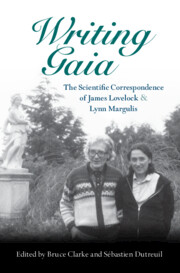Book contents
- Writing Gaia: The Scientific Correspondence of James Lovelock and Lynn Margulis
- Reviews
- Writing Gaia: The Scientific Correspondence of James Lovelock and Lynn Margulis
- Copyright page
- Epigraph
- Table of Contents
- Figures
- Contributors
- Foreword by James Lovelock
- Preface
- Acknowledgements
- Introduction
- Part I 1970–1972
- Part II 1973–1979
- Part III 1980–1991
- Part IV 1992–2007
- 1992
- 1993
- 1994
- 1995
- 1996
- 1997
- 1998
- 1999
- 2000
- 2001
- 2002
- 2003
- 2004
- 2006
- 2007
- Part V Commentaries on Lovelock and Margulis
- Glossary of Names
- Glossary of Terms
- Bibliography
- Index
1992
from Part IV - 1992–2007
Published online by Cambridge University Press: 28 July 2022
- Writing Gaia: The Scientific Correspondence of James Lovelock and Lynn Margulis
- Reviews
- Writing Gaia: The Scientific Correspondence of James Lovelock and Lynn Margulis
- Copyright page
- Epigraph
- Table of Contents
- Figures
- Contributors
- Foreword by James Lovelock
- Preface
- Acknowledgements
- Introduction
- Part I 1970–1972
- Part II 1973–1979
- Part III 1980–1991
- Part IV 1992–2007
- 1992
- 1993
- 1994
- 1995
- 1996
- 1997
- 1998
- 1999
- 2000
- 2001
- 2002
- 2003
- 2004
- 2006
- 2007
- Part V Commentaries on Lovelock and Margulis
- Glossary of Names
- Glossary of Terms
- Bibliography
- Index
Summary
After more than two decades of somewhat precarious efforts, by the 1990s Lovelock’s mostly self-funded investments in Gaia theory begin to pay substantial dividends. A case in point is the £75,000 gift he received in 1992 from Knut Kloster, a Norwegian shipping magnate who studied marine engineering at MIT and then made a massive fortune reinventing the modern cruise industry. Lovelock gives the conclusion of that story in the front matter of Homage to Gaia: He was what my mental model of a Viking told me he should be … I said, “We have a charity, Gaia.” Knut broke in at once and said, “To me, charity is a dirty word. What can I do for you?” I replied, “Give me a contract to work to make Gaia scientifically acceptable. I can’t promise success but I would guess that a three-year contract at £25,000 per year would go far to achieve this objective.” And he did.
- Type
- Chapter
- Information
- Publisher: Cambridge University PressPrint publication year: 2022
- 1
- Cited by

